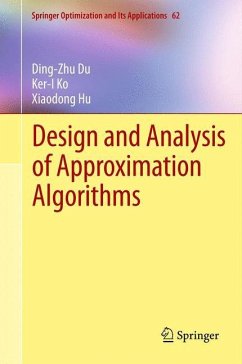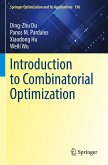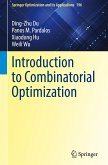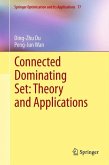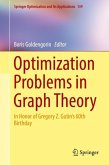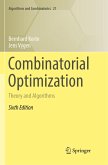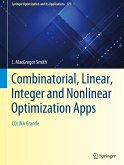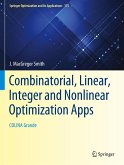This book is intended to be used as a textbook for graduate students studying theoretical computer science. It can also be used as a reference book for researchers in the area of design and analysis of approximation algorithms. Design and Analysis of Approximation Algorithms is a graduate course in theoretical computer science taught widely in the universities, both in the United States and abroad. There are, however, very few textbooks available for this course. Among those available in the market, most books follow a problem-oriented format; that is, they collected many important combinatorial optimization problems and their approximation algorithms, and organized them based on the types, or applications, of problems, such as geometric-type problems, algebraic-type problems, etc. Such arrangement of materials is perhaps convenient for a researcher to look for the problems and algorithms related to his/her work, but is difficult for a student to capture the ideas underlying the various algorithms. In the new book proposed here, we follow a more structured, technique-oriented presentation. We organize approximation algorithms into different chapters, based on the design techniques for the algorithms, so that the reader can study approximation algorithms of the same nature together. It helps the reader to better understand the design and analysis techniques for approximation algorithms, and also helps the teacher to present the ideas and techniques of approximation algorithms in a more unified way. When exact solutions are difficult to compute, the use of approximation algorithms can help. Design and Analysis of Approximation Algorithms is a graduate course in theoretical computer science taught widely in the universities, both in the United States and abroad. Even so, there are very few textbooks available for this course. Among those available in the market, most follow a problem-oriented format which is perhaps more convenient for researchers. This textfollows a more structured, technique-oriented presentation. Approximation algorithms are organized into different chapters based on the design techniques for the algorithms, so that the reader can study approximation algorithms of the same nature, together. The structure of the text guides the reader to better understanding of the design and analysis techniques for approximation algorithms, and also helps the instructor to present the ideas and techniques of these algorithms in a more unified way.
This textbook is intended for graduate students studying theoretical computer science. It can also be used as a reference work for researchers in the area of design and analysis of approximation algorithms.
This textbook is intended for graduate students studying theoretical computer science. It can also be used as a reference work for researchers in the area of design and analysis of approximation algorithms.
From the reviews: "This book is intended for graduate courses of different levels, and course plans based on different chapter selections are proposed. Each chapter is accompanied by several pages of exercises and historical notes, setting the material and the references in context. The comprehensive bibliography covers a huge amount of literature in the heuristics and approximations area, as well as specific application problems. The index is detailed. This makes the book a good source for a course on approximation algorithms. ...For the more advanced reader the book seems to be an excellent in-depth resource on approximation algorithms, for their beginning up to the latest developments." -Gudula Runger, Computing Reviews "It contains a large amount of precisely selected topics covering various aspects and design techniques related to approximation algorithms. ... It has been intended as a textbook for a graduate course in theoretical computer science. ... it can also be used as a reference book for postgraduate students and researchers in the area of design and analysis of algorithms. It also serves as a reference for established researchers by providing efficient tools for various applied areas like applied mathematics, engineering, medicine, economics, and other sciences." (Vladimír Lacko, Zentralblatt MATH, Vol. 1237, 2012) "This textbook organizes approximation algorithms into chapters based on the design techniques. ... this book is particularly suited for students who, possibly starting from scratch, want to first encounter, then absorb, and finally master the main techniques which have emerged as general paradigms in the design of approximation algorithms. This includes self-study by novices ... but also teaching by experts in standard courses." (Romeo Rizzi, Mathematical Reviews, January, 2013)

